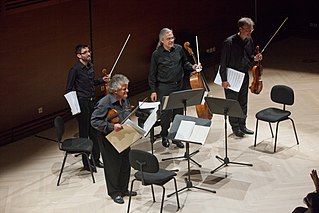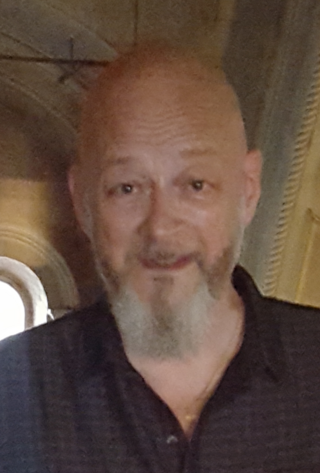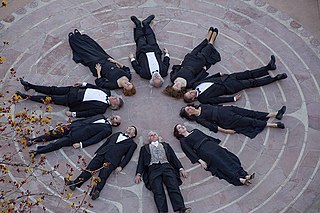Related Research Articles

György Sándor Ligeti was a Hungarian-Austrian composer of contemporary classical music. He has been described as "one of the most important avant-garde composers in the latter half of the twentieth century" and "one of the most innovative and influential among progressive figures of his time".
Juan María Solare is an Argentine composer and pianist.

The Arditti Quartet is a string quartet founded in 1974 and led by the British violinist Irvine Arditti. The quartet is a globally recognized promoter of contemporary classical music and has a reputation for having a very wide repertoire. They first became known taking into their repertoire technically challenging pieces. Over the years, there have been personnel changes but Irvine Arditti is still at the helm, leading the group. The repertoire of the group is mostly music from the last 50 years with a strong emphasis on living composers. Their aim from the beginning has been to collaborate with composers during the rehearsal process. However, unlike some other groups, it is loyal to music of a classical vein and avoids cross-genre music. The Quartet has performed in major concert halls and cultural festivals all over the world and has the longest discography of any group of its type. In 1999, it won the Ernst von Siemens Music Prize for lifetime achievement, being the first and only group to date to receive this award.
Contemporary classical music, also called modern classical, is classical music composed close to the present day. At the beginning of the 21st century, it commonly referred to the post-1945 modern forms of post-tonal music after the death of Anton Webern, and included serial music, electronic music, experimental music, and minimalist music. Newer forms of music include spectral music, and post-minimalism.

Ars antiqua, also called ars veterum or ars vetus, is a term used by modern scholars to refer to the Medieval music of Europe during the High Middle Ages, between approximately 1170 and 1310. This covers the period of the Notre-Dame school of polyphony, and the subsequent years which saw the early development of the motet, a highly varied choral musical composition. Usually the term ars antiqua is restricted to sacred (church) or polyphonic music, excluding the secular (non-religious) monophonic songs of the troubadours, and trouvères. Although colloquially the term ars antiqua is used more loosely to mean all European music of the 13th century, and from slightly before.
Unsuk Chin is a South Korean composer of contemporary classical music, who is based in Berlin, Germany. Chin was a self-taught pianist from a young age and studied composition at Seoul National University as well as with György Ligeti at the Hochschule für Musik und Theater Hamburg.

Luis de Pablo Costales was a Spanish composer belonging to the generation that Cristóbal Halffter named the Generación del 51. Mostly self-taught as a composer and influenced by Maurice Ohana and Max Deutsch, he co-founded ensembles for contemporary music, and organised concert series for it in Madrid. He published translations of notable texts about composers of the Second Viennese School, such as Hans Heinz Stuckenschmidt's biography of Arnold Schoenberg and the publications of Anton Webern. He wrote music in many genres, including film scores such as Erice's The Spirit of the Beehive, and operas including La señorita Cristina. He taught composition not only in Spain, but also in the U.S. and Canada. Among his awards is the Premio Nacional de Música.
Hans Günther Franz Otte was a German composer, pianist, radio promoter, and author of many pieces of musical theatre, sound installations, poems, drawings, and art videos. From 1959 to 1984 he served as music director for Radio Bremen. From the early 1960s onwards, Otte frequently presented contemporary experimental American composers in his Bremen radio festival Pro Musica Nova, among them in those days completely unknown people like John Cage, David Tudor, Terry Riley, and La Monte Young. From 1959 on, Otte lived and worked in Bremen, Germany. His catalogue of compositions contains more than 100 works.

Hans-Ola Ericsson is a Swedish organist and composer.

Claude Ledoux is a Belgian composer, born in 1960.
Zsigmond Szathmáry is a Hungarian organist, pianist, composer, and conductor.
Víctor Varela is a Venezuelan-Swedish composer based in Gothenburg. His compositions include works for orchestra, vocal and instrumental chamber music, with electronics and computer devices.

The Ars Nova Singers is a choral ensemble based in Boulder, Colorado. Founded in 1986, Ars Nova Singers is composed of about 40 singers who were selected through auditions from the Boulder / Denver metropolitan area. Ars Nova has achieved significant national recognition, recording ten critically acclaimed solo recordings as well as performing on seven recordings with Boulder composer and instrumentalist, Bill Douglas.
NewMusicSA is a non-profit arts advocacy organisation that promotes the creation, performance, and enjoyment of South African new music. Founded in 1999 and operating formally since 2003, NewMusicSA is the South African section of the International Society for Contemporary Music (ISCM).
Šarūnas Nakas is a Lithuanian composer, essayist, curator, filmmaker and broadcaster.
Jacqueline Nova Sondag (1935–1975) was a Colombian musician, author and composer. She is often cited as having initiated Colombia's electroacoustic musical practices.
Annette Schlünz is a German musician and composer.

Mariano Etkin (1943–2016) was an Argentine composer.
Musica Nova may refer to:
References
- ↑ Kerala J. Snyder The Organ As a Mirror of Its Time University of Rochester Professor Emerita of Musicology at The Eastman School of Music - 2002 Page 312 "When Hans Otte, then head of the contemporary music department of Radio Bremen, asked Ligeti and Hambraeus to contribute new organ works for a concert to take place in 1962 as part of the Radio Bremen series pro musica nova, they .."